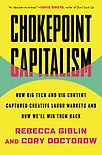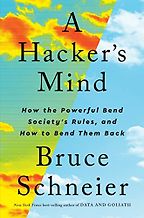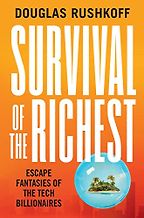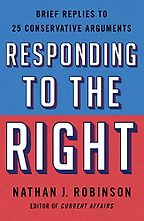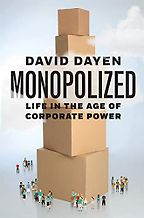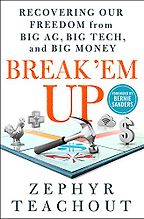You’ve called your book Chokepoint Capitalism, talking about the various ways that corporate powers place chokepoints between producers and consumers to reduce choice and increase profits. Some of the books you’re recommending are about much broader issues in the economy and society. How did you pick them?
I went through my previous two years’ book reviews and picked the five that seemed best. I’m very pressed for time with a new novel coming out next week and that was all I had time for.
Fair enough, it’s an interesting selection! Let’s start with A Hacker’s Mind: How the Powerful Bend Society’s Rules, and How to Bend Them Back, which is by Bruce Schneier (a previous Five Books interviewee). Can you tell us a little about what the book is about?
Schneier is a famous cryptographer: he wrote the basic textbook, Applied Cryptography, he’s now at Harvard’s Kennedy School of Government, and after a couple of decades of writing about security thinking he’s now thinking about security in the context of geopolitics and economics. (He’s also an old friend of mine: he designed my wedding ring, which is a cipher wheel, and he wrote the afterword to my novel Little Brother).
We hear a lot about design thinking. After 9/11 and 7/7, there were a lot of ill-considered measures taken in the name of security. Schneier states that to make things secure, we have to take a rigorous approach. So, if you’re making everybody take off their shoes, you have to think about where else they might conceal something. If you remove all the rubbish bins from Central London, you have to imagine where else someone from the IRA might plant a bomb. After all, the IRA’s campaign was not a litter-oriented campaign. Nor was Osama bin Laden an opponent in civil aviation. You need to approach this in a systematic way.
He says when we think about the tax code, real estate regulation, financial rules, and security problems, we need to apply security thinking. If we plug this loophole, what remaining loopholes might our adversaries switch to? If we design a system of this degree of complexity, what lurking unsuspected bugs might it contain that we can never address, which might be eliminable if we reduce the complexity of the system through fundamental refactoring?
Schneier is adding power to the story of security and moving beyond the technical dimension, and even the social dimension, into the political economy. Security experts have long understood that there’s a social dimension to security. One of the easiest ways to break into a computer system is to call the owner and pretend to be a police officer and say, “I really need you to give me this information from your system.” That works surprisingly well.
What we’re learning from things like the Twitter Files is that it isn’t always someone pretending to be a police officer. Sometimes someone calls up and says, truthfully, “I am with the FBI—or the Home Office, or a very large corporation that you’re very dependent on—and I require you to do these things that violate your policies and put other people at risk.” When that happens, no policy and no technology can defend against it. The only things that defend against that are accountability, pluralism, and deconcentrating power.
Chokepoint Capitalism focuses on an over-concentration of corporate power in the creative industries. Can you tell us a little more about that?
Chokepoint Capitalism is a book I co-authored with copyright scholar Rebecca Giblin from the University of Melbourne. It’s about concentration in the labor market for creative work and what we can do about it.
The first half of the book is composed of case studies that dig into the complex accounting scams that allow the entertainment industry to steal from its workforce. The second half of the book presents detailed systemic solutions that are shovel-ready.
Anything that can’t go on forever will eventually stop. As the creative labor markets have lurched from crisis to crisis, the absence of well-developed proposals for alternatives has led us to keep doing the same thing and hoping for a different outcome.
Our theory of change is that if we can introduce these ready proposals, when crisis strikes again, we can do something different. I mention this because the first half of the book is so enraging that readers have told us: “I got to chapter six and I heard this high-pitched whining that I realized was an incipient rage aneurysm. For my own well-being, I had to put the book down.”
I’m here to tell you that you’ve got to finish the book. The second half of the book provides relief by telling you what we can do about it. I promise you don’t need to only buy fair-trade music. It’s about how we can systematically alter the arts market so that workers get a larger share of the outcome and capital gets a smaller share. Workers within the creative industries (including editors, people who work at labels, and so on) and everyone in our audiences are class allies against the forces that want to drain all of our pocketbooks and treat us as badly as they can.
Are there any lessons to be learned about how to prevent bad laws and policies getting passed in the first place?
Chokepoint Capitalism is about what’s wrong and about what to do about it. All of our answers are systemic solutions presented as alternatives to what we’ve done for the last 40 years whenever copyright has been in crisis, which is to add more copyright.
In a world where there are only five major publishers that can bring your book to market, any copyright given to authors is transferred to those publishers. Just as if your kid gets beaten up for his lunch money every day and you give him extra lunch money, he’s going to get beaten up for the extra lunch money, too.
We have to think about power as an important mechanism here. When sampling arose, at first no one knew how to manage it within copyright. It wasn’t considered part of the copyright question. If you go to New Orleans and hear a jazz band, the horn player will drop a couple of bars of something familiar in the middle of a solo, and it’s not a copyright violation. It’s not even fair dealing or fair use; it’s just cultural practice. That was how sampling was treated. Over time, through precedent, and through business practice, we created an exclusive right to control samples.
Immediately, the Big Three labels amended their standard terms so that you couldn’t license a sample without signing a label contract. Every label contract now required you to sign away the rights to profit from your own samples, which meant that everyone who wanted to use samples had to pay the shareholders of the record labels. Musicians didn’t get any more money. As a class, musicians got less money.
Taylor Swift is the most powerful bargainer in music today, the most popular recording artist and touring artist in the Western world, and she couldn’t get control of her masters back. A private equity weirdo acquired those masters and refused to sell them back to her at any price. He sold them to a private equity fund owned by the Disney family. He made sure that he would get a long-term revenue stream from that, not because he needed it but because he vindictively wanted her to know that every time her music gave someone pleasure, he would make money from it.
However, everyone in the world has the right to record a Taylor Swift song under this thing called the compulsory license. It’s a collective right owned by everyone who cares about music… including Taylor Swift.
So Swift recorded cover albums of her own albums. These are available for sale and for streaming from everywhere you can get her albums in their original form. The cover albums are better, they’re blessed by her, and this creep doesn’t get a penny.
As we contemplate the rise of AI as a means of displacing creative income, a lot of creators are saying, “We will create the right to decide who can train a model with my work.” However, we already know how that’s going to work. Let’s say you’re a voice actor. The game studios that employ voice actors now begin every session with this kind of ritual recitation: “My name is Cory Doctorow. I freely and permanently assign the right to train a machine-learning system with my voice.”
“To be a part of the ruling elite, you must distance yourself as far as possible from any productive activity”
The game studios, and all the entities who have chokeholds over our creative labor markets, have motive, means, and opportunity to transfer any new right to train to themselves. They are the only ones who want to reduce creative labour’s share of the income.
Kids making memes on social media don’t want to stop artists from getting paid, nor do they pay artists. They’re orthogonal to the question of how artists get paid. If, in the name of stopping those people, we create a new right to train, that right will land with the giant media conglomerates.
Schneier suggests that we approach this as a security problem. What can we do as a countermeasure? We could say, as the US Copyright Office thus far has been very consistent in saying, that there is no copyright on machine-learning-generated works.
As copyright adheres at the moment of fixation of the creative work generated by a human, Disney can therefore amend its animators’ contracts to require them to sign away the training rights. They can create models that, based on a prompt, can produce Pixar cartoons while the executive is out at lunch. However, that model will not attract a copyright, and everything in that model’s output doesn’t attract a copyright. Disney can release that movie, but everyone else can take it and sell it. At that point, Disney may say, “We will just pay the animators.” That’s how you think through this security problem that factors in power.
Your next recommendation for us is Survival of the Richest by Douglas Rushkoff—can you tell us a little more about this work?
This book’s inception occurred during this weird speaking gig at a billionaire’s retreat in a desert. Doug is a great writer, and a friend, I’ve followed his career for decades. He thought he was there to be a futurist and talk about futuristic stuff, and he goes to the session and it’s just five guys in a room. He says, “I have a speech.” They say, “We don’t want to hear the speech. We want to ask you what we should do to prepare for the end of the world. If we’re in a luxury bunker and we have mercenaries keeping us safe from the slobbering hordes outside, how do we keep the mercenaries from killing us to take the food in our bunker? We need your help with this stuff.” They’re all sitting there, larping Mad Max.
Survival of the Richest addresses what has happened to rich weirdos and what is going on in their minds. Doug writes that the increasing trend of financialization over 40 years is to go meta. Rather than providing a service, you intermediate a service. Rather than intermediating a service, you sell intermediation tools for services. Rather than selling intermediation tools for services, you sell futures in intermediation tools for services. Rather than selling the futures, you sell derivatives of the futures.
The productive economy exists as a chip in a casino where the people who participate in the productive economy aren’t welcome. To be a part of the ruling elite, you must distance yourself as far as possible from any productive activity or anything tangential to the productive activity. This describes the arts market, which keeps moving away from being the helpmeet and service provider to creative labor, to becoming a parasitic intermediator.
In Chokepoint Capitalism, in the second half of the book where we present the solutions, we have a case study that relates to unionization. The Writers Guild of America in Hollywood had found that the number of agencies they dealt with had dwindled because four firms had acquired all their competitors. Two of these firms had been backed by private equity companies and saddled with huge amounts of debt that would tank the companies if they couldn’t figure out a way to get more profits.
“I think that we underrate solidarity”
These four agencies abandoned the traditional model, where the agent bargains for the best deal they can get for the writer and then takes a 10 per cent commission, and moved to a packaging model instead. They would approach the studio and say, “We’re going to get you a writer, a director, and a couple of stars from our talent pool. We’re not going to charge any commission to those creators because we’re such good-natured souls. Instead, we’re going to take a fee from you.”
As productions have fixed budgets, every dollar that goes to an agent in fees is a dollar that doesn’t go to a writer in salary. The writers discovered that, very often, the 90/10 split had become a 10/90 split, and their agents were getting nine times as much as the writers were. The agents were intending to expand on this even more. The four agencies started building their own studios, and a couple of them did build studios. They then negotiated deals with their own studios on behalf of their own clients.
The Writers Guild created a code of conduct and said, “No more packaging deals, no more studios. You sign it or we fire you.” The agencies said, “You’re never going to fire us.” On one day, all 7,000 members of the Writers Guild fired every agent in Hollywood. They ground out a 22-month strike until every single one of those agencies, including the ones that were indebted to their private equity owners and would not survive if they couldn’t go on exploiting writers in this way, caved. As it turns out, you can make a Hollywood movie without a Hollywood agent, but you can’t make a Hollywood movie without a Hollywood writer.
The agencies are an example of going meta. This is survival-of-the-richest business. The fact that they were backed by private equity is not a coincidence. Private equity is about going meta. It’s about moving from a posture of delivering value and facilitating valuable production to extracting a rent from it.
What do you think enabled the writers to successfully organize on this issue?
It was solidarity. We talked to David Goodman, who was our interlocutor for our LA launch at the Beverly Hills Public Library. He’s the showrunner for Family Guy and has done a lot of other great stuff, and he was running the Guild at that time.
He told us there were writers who the agencies didn’t dare to exploit in this way. There were writers who got a great deal out of this. They walked out too, because they understood that their own personal fortunes were less important than the fortune of their field. And that, because they were not getting screwed over, they were better positioned to eschew their income for twenty-two months than these baby writers who were just coming up.
It was solidarity, and it made all the difference in the world. It was quite remarkable. I think that we underrate solidarity. People are wise to the divide-and-conquer wheeze more often than we would think.
If you go to a fun fair, and at 10 o’clock in the morning you see someone walking around with a giant teddy bear that you win by throwing five balls in a peach basket, that poor sod did not throw five balls in a peach basket. The carny working the basket said, “I’ll tell you what, mate. I’m going to charge you three dollars instead of five dollars. If you can get one ball in, I’ll give you a keychain. If you win two keychains, I’ll let you trade it for a teddy bear.” The reason isn’t that the carny wants to give away teddy bears. The carny wants someone to walk around all day with a giant teddy bear so that other people will line up to put down a fiver.
There are writers out there who were getting giant teddy bears from the big four agencies. These writers knew it and they said, “I don’t owe you a shred of loyalty for this giant teddy bear. I cannot be bought for a giant teddy bear.” And they stayed out for 22 months.
Your next selection for us is Responding to the Right by Nathan Robinson. Can you tell us a little bit about this book?
Robinson is the founder and editor-in-chief of Current Affairs, which is a leftist journal. His unique selling proposition among lefty writers, editorialists, and reporters is that he spends an awful lot of time comprehensively consuming right-wing media.
He reads all the books, including biographies and memoirs. He watches Fox News. He watches weird documentaries about conspiracies–everything from 9/11 to vaccines. He systematically lays out what the argument is and what its nuances are, and where the cleavage lines are among the right. He breaks these down into about 25 different right-wing beliefs, then he describes the underlying factual matter.
There are areas in which the right is not entirely wrong. I was just talking about this with a reporter. When they say that the Davos crowd is sinister and has it in for us, they’re not wrong. I’m speaking as a Davos attendee. I didn’t pay to go; I was a speaker.
Then he lays out what you can say back. He creates what you would call in the union movement an organizing conversation about how to address these arguments. What to say to people who are enmeshed in them, but much more importantly, people who have encountered them and are like, “I just heard this thing. It sounds plausible. I don’t know what to make of what you have to say.” Rather than saying, “Oh my God! That’s a racist dog whistle. You’re a bad person for even thinking it,” he gives you the tools to have a systematic conversation that will actually change minds.
A common thread among your selections is monopolies. Your next recommendation for us is Monopolized by David Dayen; can you take us through this book?
Speaking as someone who wrote a book about monopolies, telling the monopoly story is really hard. The ways that monopolies extract income (rent) from the rest of us is performatively complicated. Some things are hard to understand because they’re complicated, but, very often, things are complicated specifically so they will be hard to understand.
Think about the Great Financial Crisis and the way that collateralized debt obligations, synthetic collateralized debt obligations, and derivatives of collateralized synthetic debt obligations all work. They were complicated so that you would not be able to understand them. The term in finance is MEGO, which stands for My Eyes Glaze Over. The idea behind it is that if you give a mark a prospectus that’s thick enough, they will assume that there’s something good in it. If you have a pile of shit that’s big enough, there must be a pony underneath it.
Dayen pulls these apart in a way that is very entertaining, and he does it sector by sector. He’s got a very good throughline. In one part, he writes about military procurement, which seems to be a very weird and esoteric area. The US military builds a lot of jets. It relies on four primary aerospace contractors, such as Boeing, to build those jets, and then it services the jets in-house.
I live in Burbank, which is a city basically created by Lockheed Martin, one of these primary contractors. When we bought our house, we got a letter from the council saying: “When Lockheed Martin left, they left a bunch of unmarked fuel depots. If you find out that your yard is full of cancer, just let us know, because we’ve got this trust fund. We will come and remove all your dirt and give you some clean fill.”
Five Books interviews are expensive to produce. If you're enjoying this interview, please support us by donating a small amount.
These primary contractors rely on secondary contractors to build the components. Some private equity weirdos got together, and they did a research project to identify all the single-source component manufacturers.
The private equity weirdos bought every manufacturer who makes a widget that no one else makes and they rolled them up into a single firm. Then, they reduced the price for primary aerospace contractors to below cost. As many of these widgets as possible are now appearing in the materiel owned by the US Air Force, US Army, and so on, and they charged Uncle Sucker a 25,000 per cent markup on replacement parts. It’s such a scam!
Abraham Lincoln refused to buy guns for the Union Army unless they used interoperable tooling and ammunition, specifically because he was worried about this shit. But here we are, in the 21st century, building billion-dollar fighter jets without the nous of a guy who learned to practice law while ploughing his dad’s field. It’s incompetence that must be deliberate. Once is accident; twice is coincidence; three times is enemy action. They have bought these jets more than three times—many more.
Dayen says that even if you hate American imperialism and know that the only thing those jets are doing is bombing Yemenis, it doesn’t matter. In addition to the sins of those American jets, there’s also the fact that a bunch of people out there are getting unbelievably rich and using that wealth to corrupt our public processes, including by demanding that America fight in more wars. This requires building more airplanes, and they’re doing it through this scam.
Dayen lays it all out in a very relatable way. He takes this performatively complicated material and opens the outer shell of the matryoshka. He removes the next shell, and the next, until he gets to the middle, and he says, “Do you see? There’s nothing good in the middle. If you keep on unwrapping it, it’s a pile of shit in the middle.”
It’s really quite masterful. Dayen is a great researcher, writer, and investigative journalist—he’s the current editor-in-chief of The American Prospect, which is a wonderful magazine. He’s a great writer on many subjects but on monopoly, I think he’s one of the best.
You mentioned that you wrote about monopolies yourself—can you say more about your own work on monopolisation?
Chokepoint Capitalism is about labor markets in the creative industries, but it’s mostly a book about market concentration. You can’t talk about labor markets in the creative industries without talking about the fact that we have five publishers, four studios, three labels, and two ad tech companies that are also app companies. One of them is the same company that does all the audiobooks and e-books.
That is the result of deliberate policy choices that arise out of a right-wing doctrine called consumer welfare, that says monopolies are beneficial because they allow the latent giants who walk among us–heroes from Ayn Rand novels–to run big enterprises better than any normal human being could. Think of the way that weirdos worship Elon Musk.
“I think that we underrate solidarity”
That is how we got to this place. It’s not a mystery how these companies grew to the scale they’re at. The way that Universal, Warner and Sony became the three labels that control 70 per cent of all sound recordings and 65 per cent of all compositions was not by investing in the best music that other people didn’t have the vision to invest in; they used their access to capital markets to do anticompetitive acquisitions. The reason we did not enforce black letter law to prevent those acquisitions—such as the Clayton Act or the Sherman Act—was because of this right-wing doctrine that came out of the Reagan era, has spread all over the world and is at breaking point. It is finally reaching the point where people are no longer willing to tolerate it.
In the UK, you have the Competition and Markets Authority taking very muscular action, and in the European Union, you have the European Commission. Here in the United States, there’s the Federal Trade Commission. Congress has introduced bipartisan legislation, co-sponsored by Ted Cruz and Elizabeth Warren, to break up the ad tech giants.
Canada, where I’m from, has the world’s least fit-for-purpose competition law, which allows for the most grotesque anticompetitive mergers. They are finally reopening the question of whether that law is fit for purpose and contemplating amendments to it. There is, at least, some progress in the frozen north.
That’s a good segue to your final recommendation for us, Break ‘Em Up by Zephyr Teachout. Can you tell us why you recommend this book?
Break ‘Em Up is a law professor’s history of anti-monopoly law: how we came to stop enforcing it, why we should continue to enforce it, and what we should do about it. Zephyr does a lot of MEGO unraveling. For example, she introduces an idea out of labor economics called ‘chickenization.’
In America, there are three poultry processors who have bought out all the poultry processors that competed with them. These three poultry processors have colluded to divide up the country, like the pope dividing the New World.
If you’re a poultry farmer, there’s only one poultry processor that will buy your birds, so that poultry processor has you over a barrel. When you enter a deal with the poultry processor, they say: “You have to buy your chicks from us. These are the vets you’re allowed to use and the medicines the vets are allowed to give them. This is the food you’re allowed to give them and how often you’re allowed to feed them. Here is the coop that you have to build. This is how often the lights go on, and this is when the lights go off.”
They control everything about your raising of those birds except for the price. The price is determined the day you bring the birds to market. The poultry processor uses their overview of the entire market to pay you just enough money to roll over your loans and do it again next year. It’s never enough to get ahead.
Anyone who speaks out against the poultry processors is struck off and blacklisted, and this is comprehensive. When someone who spoke at a state hearing on these processes was struck off and became a coop repairman, the processor said “anyone who hires this guy to fix their coop will also be struck off.”
“You’re not going to shop your way out of a monopoly”
The term chickenization describes what is formally called a monopsony: when there’s a powerful buyer instead of a powerful seller. No one knows this word because there isn’t a family-destroying board game with this name.
This monopsonistic market appears in many different sectors. It’s the motif of the tech sector. Think of Uber, where you have to supply the car; you have to drive it the way they tell you; and everything you do is scripted, down to the finest details. But you don’t know how much you’re going to get paid until you pick up your fare.
Amazon drivers have machines watching their faces and their eyeballs. The company can dock their pay if they fail to comport themselves facially in the way they’re supposed to. Their payment is determined post facto, unilaterally, by the employer. This is a very powerful employer that wields a lot of political influence.
This is the kind of thing Zephyr unravels. It resembles the creative labor market on the platform. If you work for YouTube or TikTok as a performer, your boss is an algorithm that docks your weekly pay packet according to which of its rules you’ve broken. It will not tell you what the rules are, so that you are more likely to keep breaking them.
You invest your own money and spend weeks producing a video, and the algorithm doesn’t show it to anyone—not even the people who follow you—because it violated a rule. This looks a lot like Uber, the poultry market, and many labor markets.
Zephyr Teachout is her real name, by the way. It’s an old Quaker name. She’s a hard-fighting lawyer who started out in copyright law and is now a law professor. I know her through the Netroots, which was the insurgency within the Democratic Party of Gen Xers around the time of the Kerry v. Bush elections in 2004. A bunch of people who understood the internet said, “Let’s get the Democratic Party to use the internet well.” The Dean campaign, especially, was a test case for this. I’ve known Zephyr for a very long time.
Zephyr concludes this book with an important note about individual choices. She says that you’re not going to shop your way out of a monopoly any more than you’re going to recycle your way out of a climate emergency. If you allow the dogma of individual responsibility to override your common sense intuition that these are systemic societal problems, then you will be paralyzed. If you’re on your way to protest the labor conditions in your local Amazon factory, but you never make it because you drive around for hours looking for artisanal magic markers with which to make your protest sign because you don’t want to buy them on Amazon—Amazon wins.
It’s the difference between being a vegan and having orthorexia. Being a vegan is about making some choices to make your little corner of the world a little better. Having orthorexia is being so maniacally concerned with making sure you eat in a specific way that sometimes you don’t even eat. Instead of taking systemic action to improve animal welfare or agriculture and the climate, you sit there worrying endlessly about the composition of your macronutrients and the names and labor conditions of the people who picked your soybeans.
We should care about that stuff. But if you care about that at the micro level to the exclusion of macro change, then the other side wins and you lose.
Five Books aims to keep its book recommendations and interviews up to date. If you are the interviewee and would like to update your choice of books (or even just what you say about them) please email us at [email protected]

